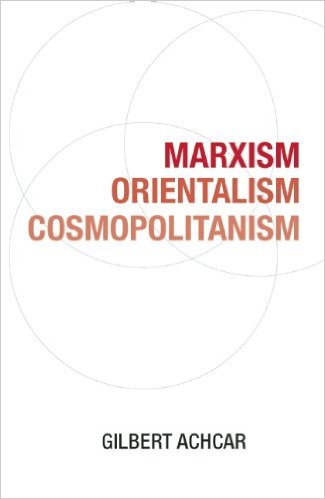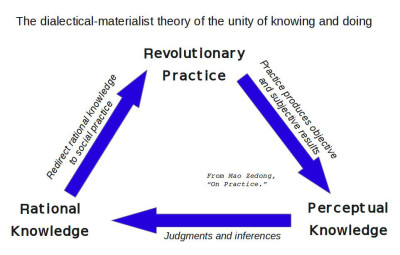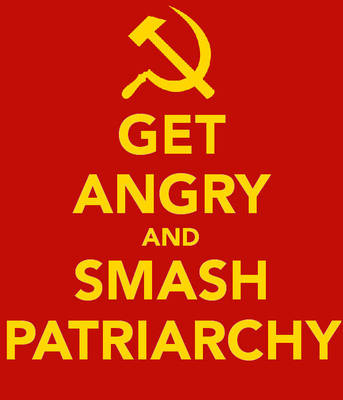
Book Review: Marxism, Orientalism, Cosmopolitanism (part 1 of 2)

Book Review: Marxism, Orientalism, Cosmopolitanism
Gilbert Achcar
Haymarket Books 2013
“Thus, as in all idealist interpretations of history, historical phenomena are fundamentally explained as cultural outcomes, as the results of the ideology upheld by their actors, in full disregard of the vast array of social, economic and political circumstances that led to the emergence and prevalence of this or that version of an ideology among particular social groups.” (p. 77)
Not too long ago the author of this book appeared on the political news show Democracy Now! with Amy Goodman. During this appearance Achcar made the statement that the people who are joining groups like ISIS and al-Qaeda in 2015 share the same socio-economic background and social alienation from the prevailing system as the people who joined the various Marxist-led movements in North Africa and the Middle East during that region’s de-colonization process. The author went on to state that it was the oppressed classes’ material existence under colonialism that pushed them towards the communist movement then, and that it is this new generation’s similar oppression that has them taking up arms once again, and not some mistaken sense of cultural-religious doom at the hands of the Christian West, no matter what some within the revolutionary Islamist movement might subjectively think.(1) In other words, what we have been seeing happening today within the majority Muslim countries is not Muslim resistance to what some have erroneously labeled a “Holy War” or cultural imperialism as seen thru the rubric of globalization. Rather, what the author says we are seeing is nothing more than the continuation of the class struggle in its religious form. And while at first glance this might seem like a breath of fresh air within an atmosphere dominated by the imperialist media, upon closer inspection what the author puts forward in this book is in fact just a more detailed and eloquent version of Bob Avakian’s proposition of the “theory of the two outmodeds”(2); a dogmatic and disingenuous, First Worldist, chauvinist re-phrasing of Engels’ negation of the negation.(3)
This book is a collection of four essays which the author describes as a comparative Marxist assessment of the role of religion today, as well as of the continuing development of religious ideology within the class struggle. The author also attempts to provide the reader with a Marxist materialist assessment of Christian liberation theology and Islamic fundamentalism not only in regards to each other but with respect to bourgeois cosmopolitanism and “revolutionary internationalism.” The focus of this review however will be on the first and last essays. Where the former offers an incisive look into the topics discussed above, the latter is an in depth and baseless attack of Stalin, in need of its own analysis which I will deal with in part 2 of this review. The following is part 1.
Religion and Politics Today from a Marxian Perspective
In this first essay Achcar introduces us to the general theme of the book: The chauvinist First World belief that Western domination of the world has brought not only progress to the Third World, but created a better overall society compared to what “Orientalism” had to offer. Orientalism is just old terminology used to describe everything east of Europe. It is also used to describe Middle Eastern and Asian societies prior to the rise of Western European colonialism, and liberation thereof. Lastly, the term and concept of Orientalism was also used to describe the re-emergence of Muslim dominance in politics and culture immediately preceding liberation in what we today call the Middle East.
Definitions aside, this book is very much inconsistent on a Marxian level as Achcar does a good job of advocating ideas long since refuted and proven incorrect by Marxist scientists, not only in the realm of theory, but in the social laboratory as well. Paradoxically however, this book has a strong dialectical thrust to it as the author uses dialectical analysis to both inform eir position and present eir thesis; yet ey fails to balance out this dialectical analysis with Marxist materialism, thus presenting us with subjective findings. Therefore, while the author takes a correct dialectical approach to the development of religion vis-a-vis the class struggle, Achcar simultaneously negates the reality of world politics in the “Orient” which of course leads em to the wrong conclusions.
This criticism of Achcar is also applicable to eir failure to locate and define the principal contradiction in the world once imperialism developed. Part and parcel to Achcar’s biased position with respect to the progress of the West is eir comparison of Christian liberation theology to Islamic fundamentalism as a philosophy of praxis categorizing both as “combative ideologies arising out of the class struggle” but thru the dominant humyn ideology (religion). However, the author incorrectly posits that the former is inherently progressive due to its origins with the oppressed and poverty stricken followers of Jesus, while the latter is inherently backward and reactionary because of its early beginnings with the Arab merchant classes of proto-feudalism. By comparing these two religions Achcar tries to have us draw parallels between the “communistic tendencies” of early Christianity and the propertied character of early Islam, thereby attempting to produce a divergence in the reader’s mind as to what is inherently progressive and what is not.
While an argument can be made to support the thesis of revolutionary Islam as the path forward for those Muslims oppressed by imperialism, less can be said of the social democratic turn that the proponents of Christian liberation theology have taken. Achcar attempts to frame the issue by hypothesizing that the world of today is the inevitable outcome of Christian liberation struggles in Medieval Europe which served as early models for bourgeois democracy through the equalization of power through armed struggle. To prove this the author finds it useful to point to various revolts and peasant struggles in the Middle Ages in which the class struggle began to take on religious overtones with the Protestant Reformation. Prior to this however, Achcar praises liberation theology as the embodiment of what ey refers to as the “elective affinity” in Christianity that can lead the world to communism. In other words, what Achcar is trying to say is that liberation theology is the positive aspect in Christianity which can also play the principal role in bridging together religion with the cause of communism. Furthermore, the author says that this elective affinity draws together the “legacy of original Christianity – a legacy that faded away, allowing Christianity to turn into the institutionalized ideology of social domination – and communistic utopianism.”(p. 17)
When pointing out examples of more contemporary struggles the author states:
“It is this same elective affinity between original Christianity and communistic utopianism that explains why the worldwide wave of left-wing political radicalisation that started in the 1960s (not exactly religious times) could partly take on a Christian dimension - especially in Christian majority areas in ‘peripheral’ countries where the bulk of the people were poor and downtrodden…”(p. 23)
When speaking of Islam’s “inherently” reactionary character today Achcar attributes it primarily to what ey describes as
“the tenacity of various survivals of pre-capitalist social formations in large areas of the regions concerned; the fact that Islam was from its inception very much a political and judicial system; the fact that Western colonial-capitalist powers did not want to upset the area’s historical survivals and religious ideology, for they made use of them and were also keen on avoiding anything that would make it easier to stir up popular revolts against their domination; the fact that, nevertheless, the obvious contrast between the religion of the foreign colonial power and the locally prevailing religion made the latter a handy instrument for anti-colonial rebellion; the fact that the nationalist bourgeois and petit bourgeois rebellions against Western domination (and against the indigenous ruling classes upon which this domination relied) did not confront the religion of Islam, for the reason just given as well as out of sheer opportunism…”(p. 24)
The author then goes on to say that Islamic fundamentalism grew on the decomposing body of Arab nationalism, citing it as “a tremendously regressive historic turn”(p.25). In reality any ideology that is based on mysticism and idealism will never be enough to defeat imperialism once and for all whether that be Christian liberation theology or Islamic fundamentalism. That said, as materialists we must still make the assessment of what movement is currently doing the most to challenge imperialism today. Is it the Islamic fighters who are engaged in a series of anti-imperialist struggles? I am reminded of something the Maoist Internationalist Movement once said in an article on pan ideologies:
“The measure of any ethnic ideology is whether it focuses its fire on imperialism as the enemy. If the pan serves to fry imperialism then it is progressive. If the pan fries non-imperialist nations, then it is reactionary and should be thrown out.”(4)
But things aren’t always so clear cut as we might want them to be, which is probably why later in that same article MIM said:
“It is only the struggle against imperialism as defined by Lenin that can really bring global peace. Other wars can bring no net gains to the international proletariat, just more or less dead exploited people. The plunder of the imperialists is much greater than that conducted by any oppressed nation’s neighbors.”(4)These statements are liberating because they free us from all the imperialist clap-trap about the evils of Islam. We are hence reminded that there is no evil above that of imperialism and so long as these movements keep their sights trained on the imperialists then they will remain “inherently” progressive.
On that same note, not everything in the book is bad, and we should at least give Achcar some credit for pointing out that even Islamic fundamentalism can be divided into separate entities, instead of simply painting all Islamic fighters with a single brush as most Western intellectuals tend to do:
“Thus two main brands of Islamic fundamentalism came to co-exist across the vast geographical spread of Muslim majority countries: one that is collaborationist with Western interests, and one that is hostile to Western interests. The stronghold of the former is the Saudi Kingdom, the most fundamental, obscurantist of all Islamic states. The stronghold of the anti-Western camp within Shi’ism is the Islamic Republic of Iran, while its present spearhead among the Sunnis is al-Qa’ida.”(p. 25)
Conclusions
As student-practitioners of Marxism-Leninism-Maoism we would be wise to keep in mind that Marxist philosophy and methodology is based on the most radical rejections of philosophical idealism with emphasis on revolutionary practice. Therefore our criticisms of religion and religious ideology should remain within the scope of critiquing certain ideological props as used by the imperialists to justify and support capitalism-imperialism along with all of its oppressive structures which made up the world today, for the explicit purposes of changing the world today and certainly not to critique religious believers or religion per se. In addition, organizations like those coming out of Islamic fundamentalism should be viewed by revolutionaries as developing out of the principal contradiction filling the voids left by the Marxists and revolutionary nationalists when those movements were either smashed or capitulated. Rather than denigrating these combative ideologies the way that Achcar does, bemoaning the day that revolutionary Islam stepped in to fill Marxism’s shoes, we should instead champion their victories against imperialism while simultaneously criticizing where they fail to represent the true interests of the Muslim people.
As Achcar correctly states, the hystory of Islam in combating Western interference in the Orient is but the natural dialectical progression of the anti-imperialist struggle absent a strong communist movement. However, it is Western nihilist politics in command which fails to appreciate the positive role that Islamic fundamentalism plays in the anti-imperialist fight. Much in the same way that Christian liberation theology did in countries like Nicaragua and El Salvador. While the author raises a lot of good points in this book ey still fails to arrive at the correct conclusions. Real internationalists will not hesitate to celebrate every blow struck against the imperialists when it comes from the oppressed, whereas First World chauvinists hiding under the cloak of communism will continuously cringe at the barbarity of the oppressed for fighting back the only way they can. Achcar admittedly criticizes Islam’s inherently “reactionary” character while simultaneously putting forth the concept of “cosmopolitanism” under the guise of anti-Stalin vitriol and so-called “internationalism” reducing revolutionary nationalism as inherently reactionary much in the same way ey does Islam. These final topics will be dealt with at length upon the second half of this review.
Related Articles:This article referenced in:











